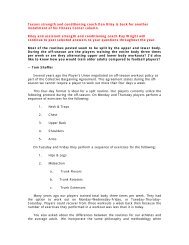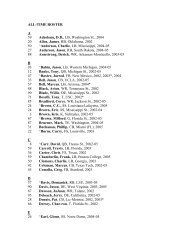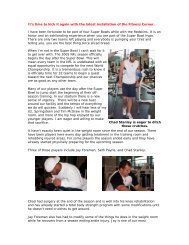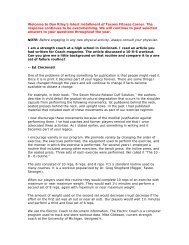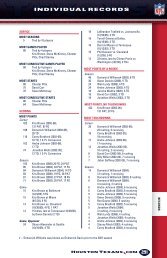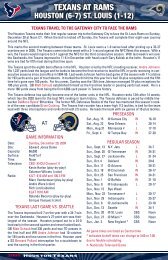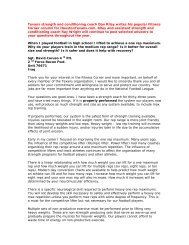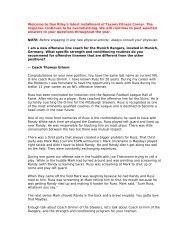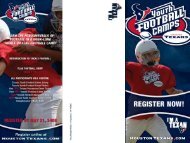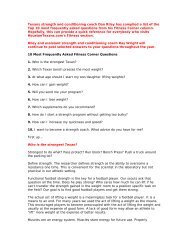HOUSTON TEXANS STRENGTH & CONDITIONING PROGRAM ...
HOUSTON TEXANS STRENGTH & CONDITIONING PROGRAM ...
HOUSTON TEXANS STRENGTH & CONDITIONING PROGRAM ...
You also want an ePaper? Increase the reach of your titles
YUMPU automatically turns print PDFs into web optimized ePapers that Google loves.
Carbohydrates<br />
Carbohydrates are your best source of energy. The body can break carbohydrates<br />
down into a usable source of energy rapidly. It is the best health food you can eat. It is<br />
the jet fuel of food. Sixty percent of your daily caloric intake should come in the form of<br />
carbohydrates. Good sources of carbohydrates include bread, grains, cereals, pastas,<br />
fruits, and vegetables. 60% of your daily caloric intake should come in the form of<br />
carbohydrates.<br />
Fats<br />
Fat is a poor source of energy. It takes the body a long time to break it down into a<br />
usable fuel. If the body cannot break it down to a usable source of energy it stores it as<br />
fat in the body. There are two types of fat, saturated and unsaturated. Saturated fats<br />
include animal fats which is damaging when too much is consumed. Other common<br />
sources of saturated fat include butter, margarine, cream, salad dressings, cheese,<br />
shortening, whole milk, fried foods, chocolate, and many pastries. Unsaturated fats are<br />
less harmful. Examples include corn oil, olive oil and peanut oil.<br />
The additional fat serves no value except to insulate the body and make it more<br />
buoyant. Unless you plan on swimming a long distance in cold water, there’s no<br />
advantage to adding any excess fat to your body.<br />
Only 25% of your daily caloric intake should come in the form of fat.<br />
Protein<br />
Protein is primarily used to rebuild and repair muscle. It is broken down into amino<br />
acids for the muscles and other tissues to use. It is a poor source of energy. Most people<br />
consume far more protein than they need. Excess protein is converted to fat and stored in<br />
the body, or excreted in your waste products.<br />
Good sources of protein include dairy products, lean meats, fish, and chicken.<br />
Protein pills and powders (including amino acids) are a waste of money. Amino<br />
acids became the “super potion” of the 1990’s. However, the literature states that the<br />
body can obtain all essential amino acids from a balanced diet.<br />
Additional protein supplementation is both expensive and unnecessary. Covert Bailey,<br />
a fitness expert, states, “A growing body of evidence indicates that consuming too much<br />
protein is not only foolish; it can be harmful.”<br />
The Federal Trade Commission (FTC) in Washington, D.C., published a report<br />
entitled “Protein for Athletes.” In this report the FTC states that athletes don’t need any<br />
more protein than the suggested RDA. People selling supplements tell athletes<br />
otherwise.<br />
The report says, “...many protein supplement manufacturers use such misconceptions<br />
to promote their powders, tablets, or liquids to athletes -- a group that is particularly<br />
susceptible to health and body building claims. Athletes have bought the claims and the<br />
supplements. Now the FTC staff says the supplements are generally unnecessary and, in<br />
some instances, cause decreased muscle efficiency and performance.”<br />
Instead of wasting money on supplements, you should use that money to purchase lean<br />
meats, fish, and chicken. The FTC states, “Protein supplements are more costly per<br />
ounce than protein in food form.” The FTC report adds, “...supplements are, in general,<br />
of a lower quality protein.”<br />
Anding/Riley/Wright 9



